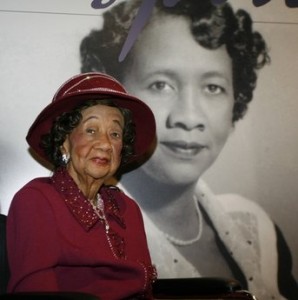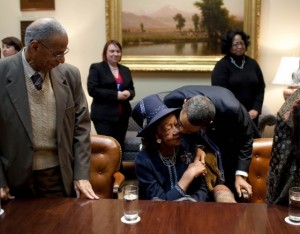It might seem incomprehensible that one could take a college course on the 1960s civil rights movement and not recall anything about Dorothy Height. Yet this was my embarrassing state of black consciousness back in the early 1980s.
Perhaps it was caused by the second-hand smoke I blithely inhaled during my college days. But the more literate answer is that Rosa Parks so dominated what little reference was paid to women in the movement that others like Height were lucky just to receive honorable mention.
 Nonetheless, as it was with other academic subjects, I acquired and retained more knowledge by reading informally about the civil rights movement after college than I ever did during my college … daze. And it was during this autodidactic phase that I came to appreciate the unsung heroics of Dorothy Height.
Nonetheless, as it was with other academic subjects, I acquired and retained more knowledge by reading informally about the civil rights movement after college than I ever did during my college … daze. And it was during this autodidactic phase that I came to appreciate the unsung heroics of Dorothy Height.
In fact, her activism dates back to the New Deal, which preceded Parks’s seminal decision to sit in the front of the bus by more than two decades. This means that even before Martin Luther King Jr. came on the scene she was already lobbying everyone from presidents to school superintendents on such issues as voting rights, public housing, and school desegregation.
As a teenager, Height marched in New York’s Times Square shouting, “Stop the lynching.” In the 1950s and 1960s, she was the leading woman helping King and other activists orchestrate the civil rights movement, often reminding the men heading the movement not to underestimate their women counterparts. (nytimes.com, April 20, 2010)
The vehicle Height used to drive most her activism was the National Council of Negro Women, which she led for 40 years. Of particular note is the fact that she established common cause with white women – through her “Wednesdays in Mississippi” meetings – to pursue racial justice and gender equality as one holistic cause for human rights. Further to this end, she was a founding member, along with feminists like Gloria Steinem and Betty Friedan, of National Women Political Caucus in 1971.
It seems clear, however, that Height was ever mindful that her crusade for civil rights for blacks and equal rights for women were both rooted in the withering black family. No doubt this is why the National Black Family reunions, “a three-day cultural event” that began in 1986, figured so prominently later in her life.
Yet, like MLK, she was always keen to point out that beyond making life better for blacks and women, the aim of her activism was to make America a more perfect union.
Having worked hard for civil rights and opportunities, I was excited… The fact that we won the Civil Rights Act of 1964, which eliminated legal segregation, made the country better not just for black people, but for white people, too. (washingtonpost.com, April 20, 2010)
Height was the recipient of many honorary degrees and prestigious awards. Most notably, she was awarded two of the nation’s highest civilian awards: the Presidential Medal of Freedom in 1994 from President Bill Clinton and the Congressional Gold Medal by President George W. Bush in 2004.
 After standing next to MLK 47 years ago when he delivered his “I have a Dream” speech, it must have been a dream come true for Height to be sitting on the podium last year when Barack Obama took his oath to become the first black president of the United States. President Obama paid tribute to her yesterday by calling her:
After standing next to MLK 47 years ago when he delivered his “I have a Dream” speech, it must have been a dream come true for Height to be sitting on the podium last year when Barack Obama took his oath to become the first black president of the United States. President Obama paid tribute to her yesterday by calling her:
…the godmother of the Civil Rights Movement and a hero to so many Americans. (whitehouse.gov)
According to CNN, Height, who never married, died of natural causes at Howard University Hospital on Tuesday. She was 98.
Farewell Dorothy…
Leave a Reply
You must be logged in to post a comment.